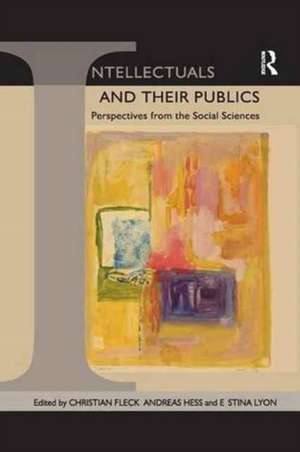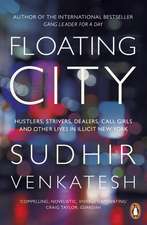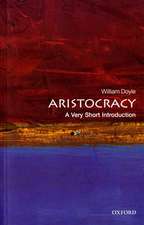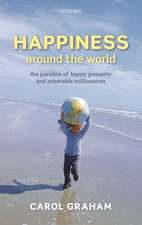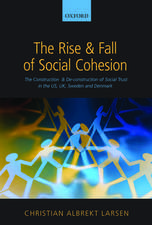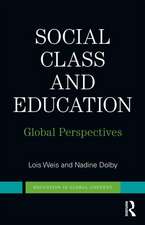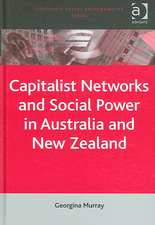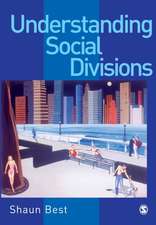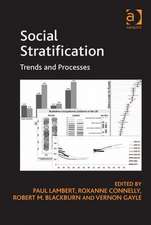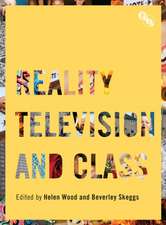Intellectuals and their Publics: Perspectives from the Social Sciences
Autor Christian Fleck Editat de Andreas Hessen Limba Engleză Paperback – 11 noi 2016
| Toate formatele și edițiile | Preț | Express |
|---|---|---|
| Paperback (1) | 461.48 lei 43-57 zile | |
| Taylor & Francis – 11 noi 2016 | 461.48 lei 43-57 zile | |
| Hardback (1) | 1044.68 lei 43-57 zile | |
| Taylor & Francis – 28 dec 2008 | 1044.68 lei 43-57 zile |
Preț: 461.48 lei
Nou
Puncte Express: 692
Preț estimativ în valută:
88.34€ • 90.86$ • 73.29£
88.34€ • 90.86$ • 73.29£
Carte tipărită la comandă
Livrare economică 17 februarie-03 martie
Preluare comenzi: 021 569.72.76
Specificații
ISBN-13: 9781138260184
ISBN-10: 1138260185
Pagini: 292
Dimensiuni: 156 x 234 mm
Greutate: 0.45 kg
Ediția:1
Editura: Taylor & Francis
Colecția Routledge
Locul publicării:Oxford, United Kingdom
ISBN-10: 1138260185
Pagini: 292
Dimensiuni: 156 x 234 mm
Greutate: 0.45 kg
Ediția:1
Editura: Taylor & Francis
Colecția Routledge
Locul publicării:Oxford, United Kingdom
Notă biografică
Christian Fleck is Professor of Sociology at the Karl Franzens University of Graz and Director of the Archive for the History of Sociology in Austria. He has been a Fellow at Harvard University and at the Center for Scholars and Writers, New York Public Library and in Spring 2008 he was Visiting Austrian Fulbright Professor at the University of Minnesota, USA. Andreas Hess is Senior Lecturer in Sociology at University College Dublin. Amongst his previous books are Concepts of Social Stratification: European and American Models (2001); American Social and Political Thought: A Concise Introduction (2000) and (as editor) American Social and Political Thought: A Reader (2003) E. Stina Lyon is Professor and Pro Dean for the Faculty of Arts and Human Sciences at London South Bank University. Her present research interests are in the history of sociology, particularly with reference to sociological research methods.
Recenzii
'This exciting and provocative collection takes up the contemporary challenges facing intellectuals from an historical and biographical perspective. A stimulating book sure to ignite controversy about the fraught relation of intellectuals to their publics.' Michael Burawoy, University of California, USA 'Have 'intellectuals' disappeared, replaced by 'experts' in an age dominated by the mass media? Does the idea of the 'public' still make sense in such an age? This book provides a magisterial survey of these and other key questions concerning the practical impact of intellectual reflection.' Anthony Giddens, Former Director of the London School of Economics and Political Science, UK 'Public intellectuals play a crucial role today, both in nearly every country of the world and at a global level. Contributors to this book bring social science research to bear on national differences and historical changes in the relationship of intellectuals to different publics and issues. They show how changes in media, democratic institutions, and academic fields have all influenced the ways in which intellectuals inform public debates. This is timely and important.' Craig Calhoun, President of the Social Science Research Council and New York University, USA. '...the contributors offer a sobering reminder that some of those listening most intently to academics' views have been the people with guns, grudges, gulags and an extremely dim view of intellectual freedom...there may be no more loin-girding way to start the year' The Times Higher Education '...there are many interesting observations and reflections in this collection, which can contribute to an understanding of the pressing question of the role of public intellectuals in history and in contemporary public life.' American Journal of Sociology
Cuprins
Introduction; One: Provocations; 1: Public Intellectuals and Civil Society; 2: Can Women Be Intellectuals?; 3: Terrorism and the Betrayal of the Intellectuals; Two: Complications; 4: European Civil Society and the European Intellectual: What Is, and How Does One Become, a European Intellectual?; 5: What Influence? Public Intellectuals, the State and Civil Society; 6: Public Intellectuals, East and West: Jan Pato?ka and Václav Havel in Contention with Maurice Merleau-Ponty and Slavoj Žižek; 7: Public Intellectuals and Totalitarianism: A Century's Debate; Three: Case Studies; 8: Tocqueville as a Public Intellectual 1; 9: Tocqueville's Dark Shadow: Gustave de Beaumont as Public Sociologist and Intellectual Avant la Lettre; 10: French Sociologists and the Public Space of the Press: Thoughts Based on a Case Study (Le Monde, 1995-2002); 11: You Only See What You Reckon You Know: Max and Marianne Weber in the United States of America at the Turn of the Twentieth Century; 12: Towards a Sociology of Intellectual Styles of Thought: Differences and Similarities in the Thought of Theodor W. Adorno and Jürgen Habermas; 13: Women as Public Intellectuals: Kerstin Hesselgren and Alva Myrdal; 14: How Hayek Managed to Beat Lazarsfeld: The Different Perception of Two Sub-fields of Social Science 1; Three: Conclusion
Descriere
The ever changing role of an intellectual in this new age of political uncertainty is innovatively focused on within this exciting collection of essays. Its provocative studies and multifaceted responses promote a vigorous debate of individual case studies and will be of particular interest for sociologists, political theorists and historians of ideas.
